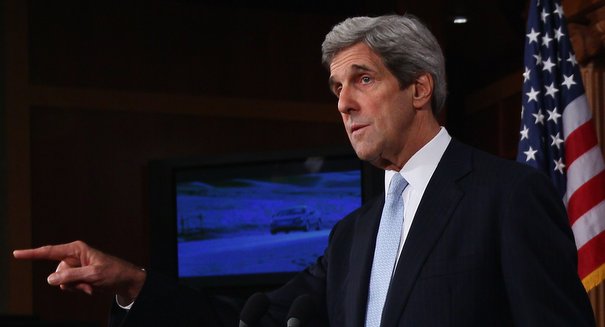David Rothkopf
{
"authors": [
"David Rothkopf"
],
"type": "legacyinthemedia",
"centerAffiliationAll": "",
"centers": [
"Carnegie Endowment for International Peace"
],
"collections": [],
"englishNewsletterAll": "",
"nonEnglishNewsletterAll": "",
"primaryCenter": "Carnegie Endowment for International Peace",
"programAffiliation": "",
"programs": [],
"projects": [],
"regions": [
"North America",
"United States"
],
"topics": [
"Political Reform",
"Democracy",
"Security",
"Foreign Policy"
]
}
Source: Getty
The Other Pivot
The Obama administration's most important international affairs legacy could well be the restoration of diplomacy to its proper central place in U.S. international policy.
Source: Foreign Policy

But a number of factors have produced what might be seen as a surprising reversal. Why surprising? Because the changes have come during an administration in which the White House has actively controlled policy formation (so give the president and his advisors credit for recognizing the need for the renaissance of diplomacy), while the technological trends mentioned above have only continued to reduce the role played by most ambassadors.
First, the president came into office with an openness to engagement that set the stage. Say what you will about Obama: He has at least resisted the unconstructive view that speaking to our enemies was a sign of weakness. Next, America's domestic economic problems, our wounds from Iraq and Afghanistan, and our consequent reluctance to get involved in major military operations overseas and the rise of other powers has made it increasingly important to be able to assemble coalitions to get anything done.
It was Clinton who played the vital role of seizing the moment and effectively putting diplomacy in action. Whether it was fashioning a next-generation coalition around the intervention in Libya, working to bring pressure on Iran with unprecedented sanctions, helping herd the cats of the international community into some action in Syria, the vital bilateral and multilateral groundwork that made the "pivot" to Asia a reality, or the renewed efforts to work effectively through the U.N. or other multilateral mechanisms, active diplomacy only grew more important over the past four years. Some of these efforts were clearly more effective than others. Some efforts -- like those to advance climate negotiations or the reset with Russia or efforts to stop the slaughter of Syrian innocents -- were frustratingly ineffective. Some -- like the embrace of emerging powers, raising the profile of groups like the Arctic Council, or the effort to negotiate a stop to Iran's nuclear program -- are clearly works in progress. But with troops being pulled out of Iraq and Afghanistan and no public appetite for future comparable interventions, it is clear that the during the next four years, America's foreign policy will turn more centrally on the effectiveness of the diplomacy Kerry leads than perhaps any comparable period since the end of the Cold War.
The centrality of diplomacy also creates the possibility of a great legacy issue for Obama's foreign policy. That issue was touched upon at the recent forum Foreign Policy conducted with the State Department called "Transformational Trends." During the event, U.S. National Security Advisor Tom Donilon was featured in a keynote conversation. Donilon is one of the key architects with Clinton of this other, more important, pivot -- the one away from a unilateralist, force-based foreign policy to one in which diplomacy, alliances, and coalition-building is more central.
In his candid, wide-ranging comments, Donilon focused on what he saw as America's unique national advantage. "We have," he said, "the ability to work anywhere in the world with allies with whom we have shared threat assessment and established habits of cooperation. This represents a deep investment in an asset none of our peers and none of our competitors have. It's a huge plus for the United States and one that we can never take for granted and must work on constantly."
He went on to say, "As a strategic matter, understanding the importance of our alliances, the renewal of our alliances has been a top priority. People will give their own grades to this. But I think it's fair to say that both in Europe and in Asia, our alliances are in quite good shape after a tremendous amount of effort."
It is hard but important to remember how damaged America's alliances were in the wake of the invasion of Iraq. But this administration came in and made restoring those alliances a top priority. The strategic rebalancing to Asia deepened existing ties from Korea to Japan to Southeast Asia to India. Developing new levels of cooperation with regional powers like Turkey and the moderate Arab states, whether in dealing with Syria or Libya or other regional issues, has been another important dimension of this overall initiative.
Much work remains to be done. Indeed, one could see a second Obama term making significant progress by building on this focus on alliances and diplomacy as the centerpiece of its foreign policy. This is a way to leverage constrained assets and to reduce risk by deepening friendships and cooperation rather than through enhancing our ability to intimidate or impose our will.
Areas of special opportunity should include: tightening ties with our European allies, possibly through seriously consider a U.S.-EU Free Trade Agreement and a similar initiative with our friends in Japan (in both cases, the key will be agricultural subsidies reform, a growing possibility given the fiscal condition of all the participants -- something that will create real goodwill and further possibilities for cooperation with emerging powers like Brazil), deepening ties with India, potentially the emerging power with whom the United States might have the closest and most important ties, strengthening NAFTA given the economic vitality and shared interests associated with the North American resource boom, and seeking institutional reforms in vital multilateral mechanisms such as the NPT, WTO, U.N. Security Council (supporting Brazilian permanent membership in addition to that of India, Japan, and Germany could strengthen ties at a very low cost to the U.S.). Finding ways to work even more effectively with vital partners in the Middle East like Turkey and the moderate Arab states, deepening ties with potential allies in Africa, and supporting our ties with key powers in Asia through moving ahead with Trans-Pacific Partnership and similar regional trade agreements would all augment this effort. Finally, realizing progress on the president's grandest of all initiatives, the one laid out in his Prague speech about moving toward the ultimate elimination of nuclear weapons, would be a dramatic triumph of diplomacy, as would brokering a much-needed deal that would bring into secure existence an independent, viable Palestine that recognizes Israel as its neighbor.
Not all of these goals will be achieved. But the reality is that all of them are possibilities and that they are being discussed. That is a tribute to some of the subtler and more positive changes made in U.S. policy over the past four years. It is also a recognition that such agreements are actually in the interests of all involved. We are, after all, at a moment in which all the world's major powers face great challenges at home and none, including the United States, can afford costly or unilateral ventures elsewhere in the world. It is a time ripe for progress in diplomacy. And we have an administration with a proven commitment to exploring avenues for diplomatic progress that also recognizes that neither America's strength nor our security can be assessed in the number of our divisions or carrier battle groups, but rather in the number of countries that view us as a friend.
About the Author

Former Visiting Scholar
David Rothkopf was a visiting scholar at the Carnegie Endowment as well as the former CEO and editor in chief of the FP Group.
- How Bush, Obama, and Trump Ended Pax AmericanaIn The Media
- A Bigger ClubhouseIn The Media
David Rothkopf
Recent Work
Carnegie does not take institutional positions on public policy issues; the views represented herein are those of the author(s) and do not necessarily reflect the views of Carnegie, its staff, or its trustees.
More Work from Carnegie Endowment for International Peace
- What We Know About Drone Use in the Iran WarCommentary
Two experts discuss how drone technology is shaping yet another conflict and what the United States can learn from Ukraine.
Steve Feldstein, Dara Massicot
- Beijing Doesn’t Think Like Washington—and the Iran Conflict Shows WhyCommentary
Arguing that Chinese policy is hung on alliances—with imputations of obligation—misses the point.
Evan A. Feigenbaum
- Axis of Resistance or Suicide?Commentary
As Iran defends its interests in the region and its regime’s survival, it may push Hezbollah into the abyss.
Michael Young
- How Far Can Russian Arms Help Iran?Commentary
Arms supplies from Russia to Iran will not only continue, but could grow significantly if Russia gets the opportunity.
Nikita Smagin
- Is a Conflict-Ending Solution Even Possible in Ukraine?Commentary
On the fourth anniversary of Russia’s full-scale invasion, Carnegie experts discuss the war’s impacts and what might come next.
- +1
Eric Ciaramella, Aaron David Miller, Alexandra Prokopenko, …












